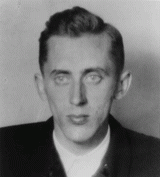You searched for: concentration camps
<< Previous | Displaying results 911-920 of 1117 for "concentration camps" | Next >>
-
Deceiving the Public
ArticleThe Nazis frequently used propaganda to disguise their political aims and deceive the German and international public. Learn more.
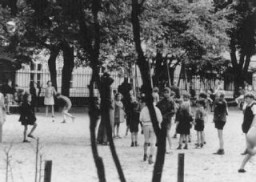
-
Lilly Appelbaum Malnik
ID CardLilly Appelbaum was born in Antwerp, Belgium to Jewish parents, Israel and Justine. Lilly's parents separated before she was born. Her father immigrated to the United States. Lilly had two older siblings, Leon (born 1927) and Maria (born 1925). She lived with her maternal grandparents in Antwerp. During the week, her mother lived in Brussels, where she operated a small workshop that made raincoats. 1933-39: Lilly and her grandparents lived in a predominantly Jewish neighborhood in Antwerp. She went to a…
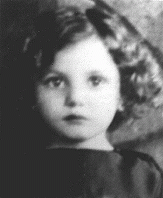
-
Ruth Webber describes escaping from a selection held in the Auschwitz infirmary
Oral HistoryRuth was four years old when the Germans invaded Poland and occupied Ostrowiec. Her family was forced into a ghetto. Germans took over her father's photography business, although he was allowed to continue working outside the ghetto. Before the ghetto was liquidated, Ruth's parents sent her sister into hiding, and managed to get work at a labor camp outside the ghetto. Ruth also went into hiding, either in nearby woods or within the camp itself. When the camp was liquidated, Ruth's parents were split up.…
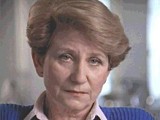
-
Ruth Webber describes the bitterness that she felt after the end of the war when she was in an orphanage in Krakow
Oral HistoryRuth was four years old when the Germans invaded Poland and occupied Ostrowiec. Her family was forced into a ghetto. Germans took over her father's photography business, although he was allowed to continue working outside the ghetto. Before the ghetto was liquidated, Ruth's parents sent her sister into hiding, and managed to get work at a labor camp outside the ghetto. Ruth also went into hiding, either in nearby woods or within the camp itself. When the camp was liquidated, Ruth's parents were split up.…
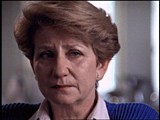
-
Ruth Webber describes the bitterness that she felt after the end of the war when she was in an orphanage in Krakow
Oral HistoryRuth was four years old when the Germans invaded Poland and occupied Ostrowiec. Her family was forced into a ghetto. Germans took over her father's photography business, although he was allowed to continue working outside the ghetto. Before the ghetto was liquidated, Ruth's parents sent her sister into hiding, and managed to get work at a labor camp outside the ghetto. Ruth also went into hiding, either in nearby woods or within the camp itself. When the camp was liquidated, Ruth's parents were split up.…

-
Ruth Webber describes the Auschwitz crematoria
Oral HistoryRuth was four years old when the Germans invaded Poland and occupied Ostrowiec. Her family was forced into a ghetto. Germans took over her father's photography business, although he was allowed to continue working outside the ghetto. Before the ghetto was liquidated, Ruth's parents sent her sister into hiding, and managed to get work at a labor camp outside the ghetto. Ruth also went into hiding, either in nearby woods or within the camp itself. When the camp was liquidated, Ruth's parents were split up.…
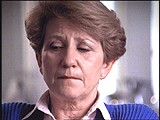
-
The Nazi Persecution of Black People in Germany
ArticleRead about the Nazi persecution of Black people, as well as Black people's experiences in Germany before the Nazi rise to power.
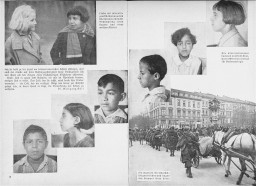
-
Mirjana Babunovic Dimitrijevic
ID CardMirjana was the second of three children born to well-to-do Serbian parents in the capital of Bosnia, in central Yugoslavia. Her father was a successful businessman and prominent Serbian nationalist. Like her parents, Mirjana was baptized in the Serbian Orthodox faith. Mirjana attended elementary school in the multi-ethnic city of Sarajevo. 1933-39: While in secondary school, Mirjana studied foreign languages and toured western Europe. In 1938 she graduated. That fall she enrolled as a student of English…
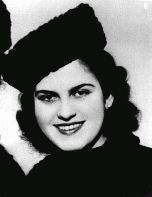
-
Mara Jovicic Popovic
ID CardMara was one of six children born to Serbian parents. The family lived in the small town of Foca in the region of Bosnia. Like her parents, Mara was baptized in the Serbian Orthodox faith. She grew up in Foca and in the Bosnian capital of Sarajevo, where she completed secondary school. In 1930 she married Rajko Popovic, a circuit court judge. The couple had no children. 1933-39: In 1934 Rajko completed a judicial tour of duty in Foca, and the couple moved to Sarajevo, the capital of Bosnia. Mara and Rajko…
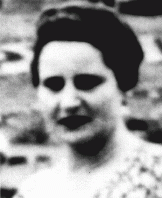
-
Wladyslaw Piotrowski
ID CardWladyslaw was born to Catholic parents in Russian-occupied Poland. He grew up in Plock, a town located in a rural area north of Warsaw. Wladyslaw married in 1918 and he and his wife, Marie, raised four children. 1933-39: Wladyslaw worked as a bookkeeper, and then as an accountant for a local farmers' cooperative. In 1931 he was sent to the town of Wyszogrod to close a failing branch of the farmers cooperative. A year later, he organized a new, successful cooperative in Wyszogrod with local farmers and…
